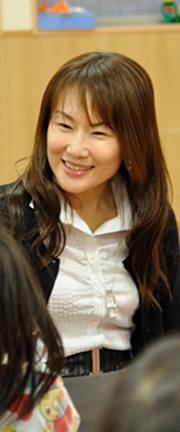 Developmental science: cultural influence on the social development
Developmental science: cultural influence on the social developmentWhat kind of being is the human? How do cultural differences in human mind affect relationships with others?
The ontogenetic process from the human’s birth (or conception) to his or her death is known as human development. In considering human development, one must think from the standpoint of phylogenesis (evolution), the process that the human species follows from its emergence to its extinction. In the course of evolution, humans have developed to have relationships with other humans and live in a group. Questions then arise with regard to how they live while communicating with others. My ultimate goal is to provide indications to these questions from the standpoint of the developmental science.
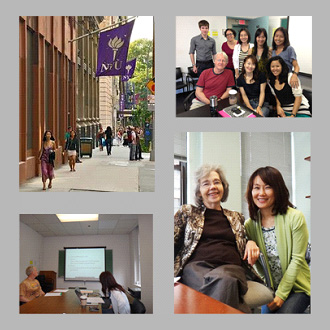 When I visited the United States, I discussed experimental hypotheses, plans, and methods with my research collaborator (Dr. Uleman) and graduate students (research assistants) at New York University.
When I visited the United States, I discussed experimental hypotheses, plans, and methods with my research collaborator (Dr. Uleman) and graduate students (research assistants) at New York University.
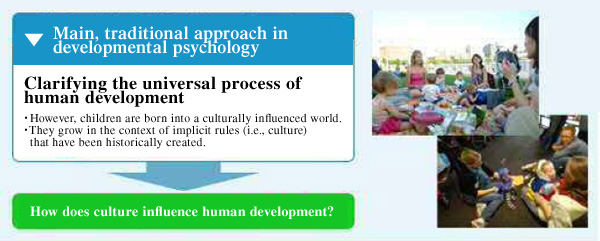
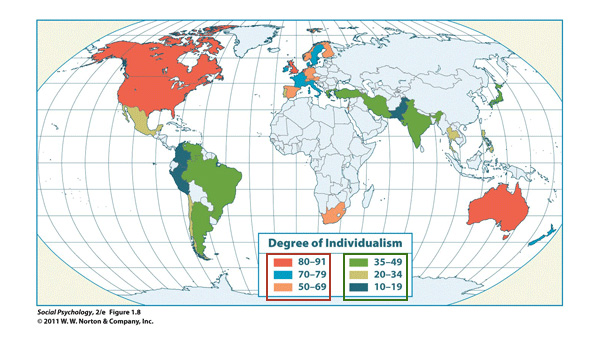
A series of recent studies have revealed that humans as social beings automatically handle cognitively sophisticated processes related to communication with others. Our research focuses on the process with which a person immediately and sometimes unconsciously infers the traits from others’ behaviors. By immediately understanding others’ traits, we not only can predict what kinds of behavior actions they will subsequently take, but also can consider how to interact with them in the future. That we possess this sort of cognitive pattern enables us to have smooth communications with others.
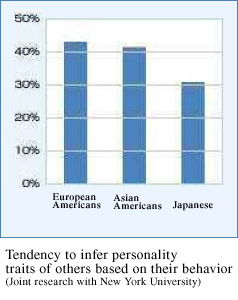 In the context described above, a question arises regarding whether such a cognitive pattern is nature or nurture. Culture is the key to seeking the answer to this question.
In the context described above, a question arises regarding whether such a cognitive pattern is nature or nurture. Culture is the key to seeking the answer to this question.
People are not born into a vacuum. Instead, they are born into and raised within an institution (namely, culture), that has been created and operated by people since ancient times. Starting at birth, humans absorb culture, grow to adapt to it, and then accept the culture to pass on to the next generation, or create a new one. Here, a question arises as to how being born and raised in different cultures causes differences in the way in which the human mind works. Specifically, do cultural differences in the mind appear in the cognitive patterns of people who try to understand others?
For example, when people see someone giving up their seat on the train, do they think that that person is kind, or is that person conscious about how others think of them if they were sitting in a priority handicapped seat? When people see a person punch someone else, do they think that the puncher is an aggressive person, or that they lost their temper because they were insulted? It is becoming clear that Asian people, who tend to see themselves and others in terms of their social attributes and roles, are more likely to put emphasis on the circumstances in which an action is taken (e.g., how others think) than European and North American people, who tend to see themselves and others in terms of their personality.
It is possible to explain the interaction between universal elements in human development and cultural differences in human mind by examining how common developmental characteristics and cultural differences in mind emerge at different points in children’s development (at 0, 1, 3, 5, 7 years old…). With interdisciplinary research between developmental psychology and cultural psychology, I think that we can tackle this significant problem: What kind of being is the human?
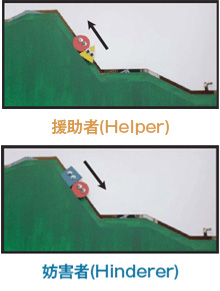
The result is that 90% of six-month-old babies prefer the helper (the triangle).
↓
At quite early stages of development, children start to show a sign of an ability to judge people’s internal characteristics by their actions.
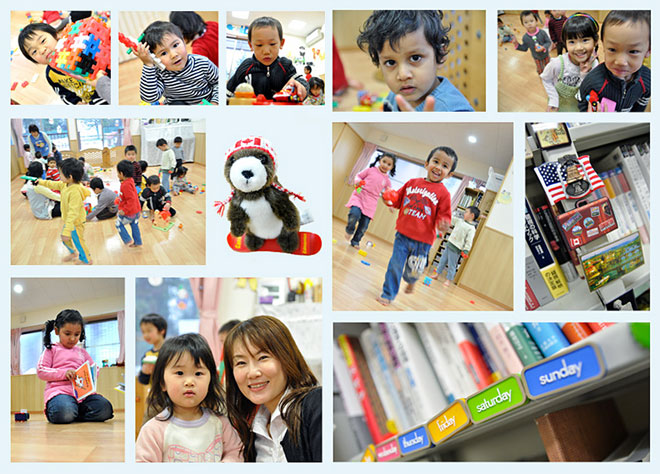
Language is communication itself. It is developed through repeated interactions with others and through trial and error.
Providing information unilaterally does not produce results
In learning a foreign language, providing information in a one-way manner is not effective. Children learn more effectively when they are exposed to the language through communication with others.
Leave some room for thinking
When asked a question by children, it is important to give an answer to only what is asked and leave some room for their thinking. It is also important to talk to them in a way to calm them and lead them to the next word.
Do not excessively react to children’s lies
At stages where children’s memory development is premature, they may not be able to distinguish reality from what they imagined or dreamed. As their memory develops, they begin to recognize things properly. It is therefore important to watch them with an open mind, without reacting excessively.
“I saw a bear as big as my brother in the woods.”
“I’ve driven a big bulldozer.”
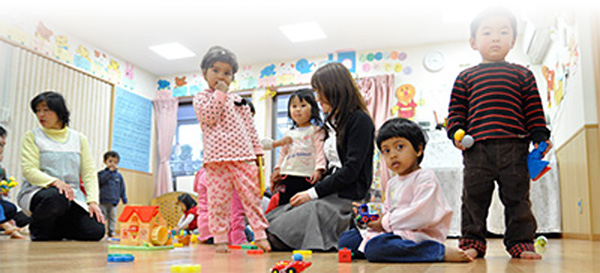
Associate Professor, Faculty of Education
Biography
Education and professional experience
Bachelor’s degree, Faculty of Letters and Education, Ochanomizu University
Doctoral degree in humanities, Graduate School, Ochanomizu University
2004 – 2006: Lecturer, Child Development Education and Research Center, Ochanomizu University
2006 to present: Associate Professor, Faculty of Education, Saitama University
2011 – 2012: Visiting Scholar, Department of Psychology, New York University
Publications
The Developmental Psychology of Mind behind Human Interactions: How Does Children’s Sociality Develop? (in Japanese). Tokyo: Kaneko Shobo, 2012. (ed./auth., with Hajimu Hayashi)
The Psychology of Understanding Children in Schools (in Japanese). Tokyo: Kaneko Shobo, 2010. (ed./auth.)
The Development of the Ability to Infer Others’ Personality Traits: A Developmental Model of Understanding Others in Early and Later Childhood (in Japanese). Tokyo: Kazama Shobo, 2005. (single-authored)
Safety and a Sense of Security in Children’s Lives: Educating the Importance of Life (in Japanese). Tokyo: Kaneko Shobo, 2010. (coauthored)
Developmental Psychology: How Do People Grow Interacting with the Surrounding World? (in Japanese). Tokyo: Minerva Shobo, 2009. (coauthored)
The Psychology of Infants and Young Children (in Japanese). Tokyo: Minerva Shobo, 2008. (coauthored)
Communication Ability for Surviving in a Risk Society (in Japanese). Tokyo: Kaneko Shobo, 2007. (coauthored)
Childcare: Learning by Example (Language) (in Japanese). Tokyo: Houbun Shorin, 2006. (coauthored)



© Copyright Saitama University, All Rights Reserved.